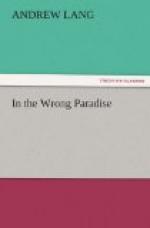“’Certainly I will do as you say, but will you reward me by explaining the reason of your request?’
“‘In me,’ said the appearance, ’you behold Francis Wilton, priest. I was born in 1657, and, after adventures and an education with which I need not trouble you, found myself here as chaplain to the family of the Lord Birkenhead of the period. It chanced one day that I heard in confession, from the lips of Lady Birkenhead, a tale so strange, moving, and, but for the sacred circumstances of the revelation, so incredible, that my soul had no rest for thinking thereon. At last, neglecting my vow, and fearful that I might become forgetful of any portion of so marvellous a narrative, I took up my pen and committed the confession to the security of manuscript. Litera scripta manet. Scarcely had I finished my unholy task when the sound of a distant horn told me that the hunt (to which pleasure I was passionately given) approached the demesne. I thrust the written confession into that volume of Cicero, hurried to the stable, saddled my horse with my own hands, and rode in the direction whence I heard the music of the hounds. On my way a locked gate barred my progress. I put Rupert at it, he took off badly, fell, and my spirit passed away in the fall. But not to the place of repose did my sinful spirit wing its flight. I found myself here in the library, where, naturally, scarcely any one ever comes except the maids. When I would implore them to destroy the unholy document that binds me to earth, they merely scream; nor have I found any scion of the house, nor any guest, except your lordship, of more intrepid resolution or more charitable mood. And now, I trust, you will release me.’
“I rose (for I had seated myself during his narrative), my heart was stirred with pity; I took down the Cicero, and lit on a sheet of yellow paper covered with faded manuscript, which, of course, I did not read. I turned to the hearth, tossed on the fire the sere old paper, which blazed at once, and then, hearing the words pax vobiscum, I looked round. But I was alone. After a few minutes, devoted to private ejaculations, I returned to the dining-room; and that is all my story. Your maids need no longer dread the ghost of the library. He is released.”
“Will any one take any more wine?” asked Lord Birkenhead, in tones of deep emotion. “No? Then suppose we join the ladies.”
“Well,” said one of the ladies, the Girton girl, when the squire had finished the prelate’s narrative, “I don’t call that much of a story. What was Lady Birkenhead’s confession about? That’s what one really wants to know.”
“The bishop could not possibly have read the paper,” said the Bachelor of Arts, one of the guests; “not as a gentleman, nor a bishop.”
“I wish I had had the chance,” said the Girton girl.
“Perhaps the confession was in Latin,” said the Bachelor of Arts.




